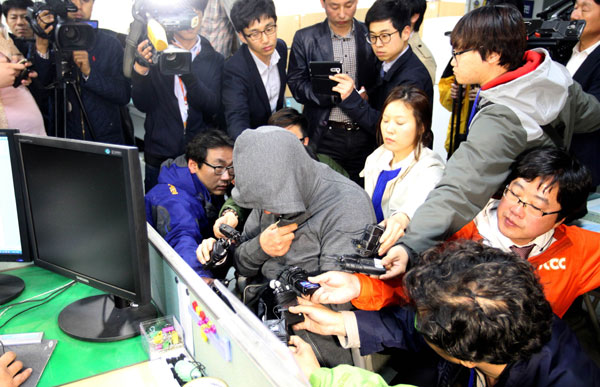
Lee Joon-Seok (C), captain of the South Korean ferry that capsized at sea off the coast of Jindo, is interviewed at Mokpo police station in Mokpo on April 17, 2014. Rescuers worked frantically on April 17 to find 300 people — mostly schoolchildren — missing after a South Korean ferry capsized, with prospects of pulling survivors from the submerged vessel dimming as emotions boiled over among anguished relatives. AFP
JINDO — The captain was not at the helm of the South Korean ferry that capsized two days ago, investigators said Friday, as anger spread over stalled rescue efforts for hundreds of missing passengers trapped by the submerged vessel.
More than 48 hours after the 6,825-tonne Sewol suddenly listed and then sank, a small of army of more than 500 exhausted divers — battling powerful currents in almost zero visibility — have yet to obtain any access to the ferry’s interior.
The confirmed death toll rose overnight to 25, but the focus of concern remained the 271 people still unaccounted for — hundreds of them children on a high school outing to the southern resort island of Jeju.
The newly recovered bodies were all floating in the water, coastguard officials said, as the dive teams worked in shifts to find a way inside the submerged vessel in the increasingly slim hope of finding survivors trapped in air pockets.
Unable to secure an entry point for now, they bored holes in the keel — a small section of which was still visible above the water — for oxygen lines.
“Two divers are currently injecting oxygen into the ship,” a coastguard official told AFP.
The weather conditions were extremely challenging, with rain, fog and strong sea swells
Of the 452 people on board the Sewol when it capsized Wednesday morning, 179 were rescued, but no new survivors have been found since Wednesday.
Three giant, floating cranes had arrived at the disaster site, but coastguard officials said they could not begin lifting the multi-layered ferry until they were sure there were no survivors inside.
Among the relatives of the missing, especially parents of the 352 students who were on board , there was growing resentment over what they see as the inadequacy of the rescue response.
‘The government lied’
In an appeal broadcast live on television Friday morning, a self-appointed spokesman for the relatives accused the authorities of indifference and deception.
“The government lied yesterday,” he said, speaking at a podium in a gymnasium on Jindo island where hundreds of blanket-wrapped relatives have been sleeping on the floor since the tragedy unfolded.
Disputing the official figures of hundreds of divers, vessels and aircraft being deployed, he said he and other relatives had visited the rescue site and seen only a dozen ships and helicopters.
“Everyone, is this the reality of South Korea? We plead once more, please save our children,” he said.
The initial public backlash has centred on the captain, Lee Joon-Seok, and his 28 crew, most of whom survived the disaster.
State prosecutors said preliminary investigations showed the third officer was at the helm of the ferry.
“The captain was not in command when the accident took place,” prosecutor Park Jae-Eok told a press briefing.
The captain was “in the back” he added, without elaborating.
The captain apologised Thursday to the victims and their relatives, but offered no clear explanation for what caused the Sewol to capsize.
“I feel really sorry for the passengers, victims and families,” Lee said. “I feel ashamed.”
Tracking data from the Maritime Ministry showed that the ferry made a sharp turn just before sending its first distress signal.
Some experts believe such a tight turn could have dislodged the heavy cargo manifest — including more than 150 vehicles — and destabilised the vessel, causing it to list heavily and then capsize.
But others suggested the turn might have been caused by a collision with a rock or other submerged object.
“Whether or not they took a drastic turnaround … is under investigation,” prosecutor Park said, adding that they were also looking at the possibility of steering or other mechanical failure.
As well the cause of the disaster, investigators will be looking at why passengers were ordered to stay in their cabins and seats for up to 40 minutes after the ferry ran into trouble.
‘I believe they are alive’
Furious relatives believe many more people would have escaped if they had reached evacuation points before the ship listed sharply and water started flooding in.
Lee Yong-Gi, whose son Lee Ho-Jin was among the missing students, said he and other parents felt bitterly let down by the rescue operation.
“It’s been two days but no one has been brought out alive,” Lee told AFP.
“I firmly believe that the kids are alive. We need to rescue them as soon as possible. But officials are dragging their feet,” he said.
Newspaper editorials were equally scathing with the Dong-A Ilbo daily calling the rescue response “ludicrous”.
“We have the world’s finest shipbuilding industry in the 21st century, but our mindset is in the 19th century,” the newspaper said.
In a tense meeting with parents in the Jindo gymnasium on Thursday, President Park Geun-Hye was repeatedly interrupted by angry shouts from the crowd.
“What are you doing when people are dying? Time is running out!” one woman screamed.
RELATED STORIES
S. Korea ferry rescue stalls as anger spreads
Transcript shows ferry captain delayed evacuation